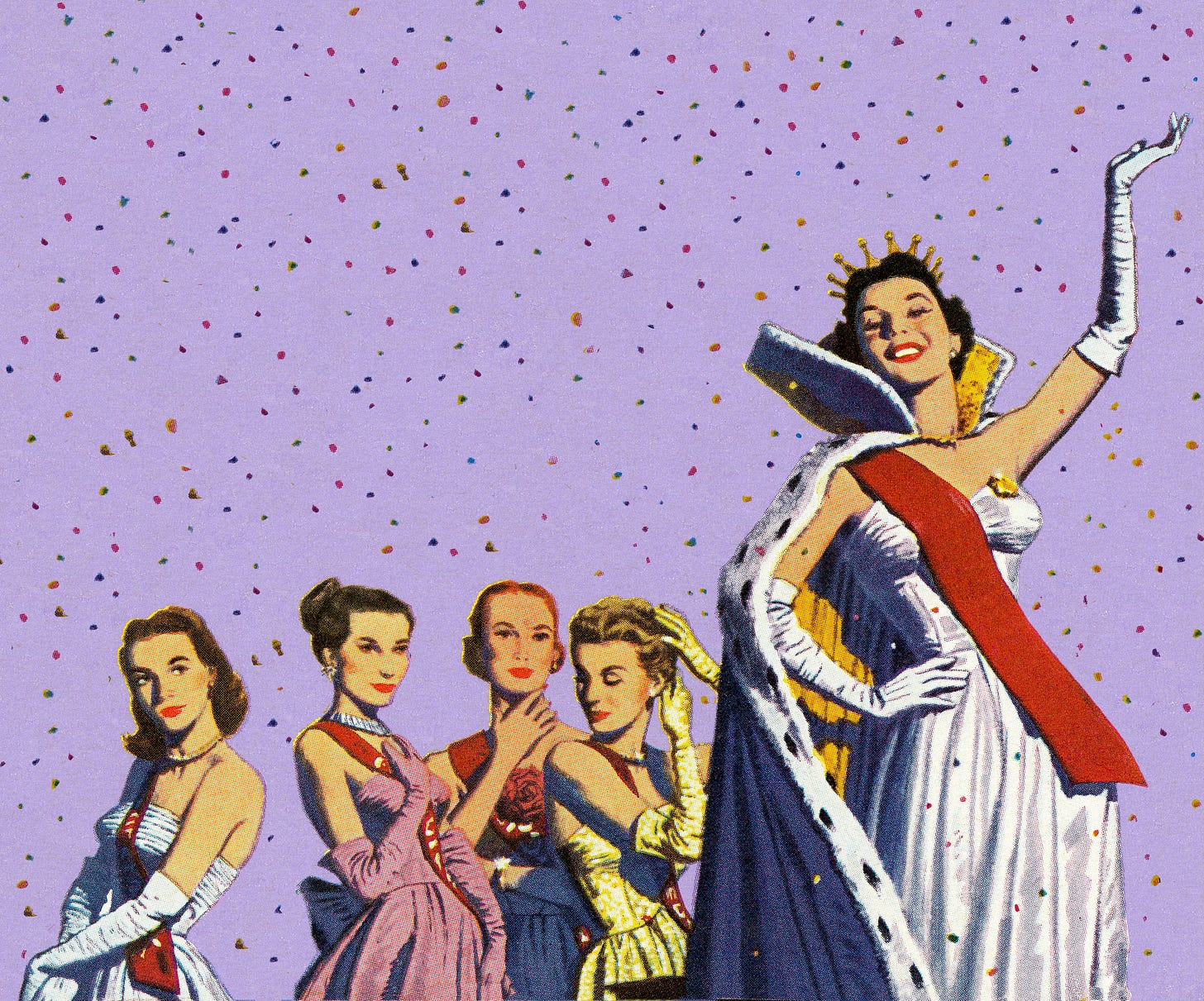The Fuss About Rush
a.k.a. that time I surprised myself and defended Bama Rush

August is a big month. It’s the most popular month for birthdays (including mine!), the month France goes on holiday, and the month for Bama Rush.
For the uninitiated, fraternities and sororities across the country deploy a recruitment program called Rush Week to attract new members. The University of Alabama (Bama) currently holds the title for Queen of Sorority Rush Week. For some reason, Bama Rush appears to have captivated bloggers, a documentary filmmaker, and me.
Every morning of second week of this month, I excitedly checked Instagram for updates on the ladies participating in this year’s Bama Rush. These updates came to me the same way they came last year – via Anne Helen Petersen, a Washington-state-based writer, self-proclaimed student of culture, and dahlia farmer. Because Ms. Petersen is an adult, she would share TikTok reels related to Bama Rush on her Instagram stories feed. And I thank her kindly! TikTok just isn’t for me.
Several times a day, girls would upload videos to social media that displayed their meticulously decorated dorm room the size of a postage stamp in the background while they talked in breathless detail about their outfit of the day (OOTD). Their anxiety over saying and wearing the right thing to gain the approval of a sorority reminded me how I agonized for weeks over whether or not to rush as a freshman at the University of South Carolina. Were the brochures true? Was Greek Life the only way to make lifelong friends I would call my sisters? My mom saw how anxious I was and graciously paid a $50 fee for me to participate in rush week. She gave me the directive to think of it as a peace-of-mind fee and not an obligation to participate. (I shudder to speculate what the fee is today.)

In the end, I made a last-minute decision to skip the rush orientation meeting held in the lobby of the tall sorority tower next to my all-girls’ dorm. Instead, I went to an open-house night at the Baptist Student Union (Ha!). I never looked back.
Bless my heart, I would have been a fish out of water if I had gone. I was in no way prepared for all the pageantry required.
Despite living next to the aforementioned sorority tower, Greek Life remained a foreign concept to me. I sorta cheered when our campus newspaper ran an op-ed by a woman who trashed the system and said ever-so-eloquently that sisters weren’t people you shared a dorm room with but rather the family with whom you shared Christmas mornings. That essay stayed on my bulletin board for a year. Over time, I’d re-read it and wonder why this system struck such a negative chord with the author and me.
No one forced me to participate in a sorority, so what did I care if women wanted to wear the Greek alphabet on their shirt and call strangers their “sisters”? Why did I care if these women had weekly meetings to learn secret handshakes and songs? When girls left the sorority tower in the wee hours of a Saturday morning to donate food at a local shelter, why did we late risers roll our eyes?
All these memories and self-admonishments came back to haunt me as I watched more and more of the videos coming out of Tuscaloosa, AL. I soon realized I wasn’t loathing the girls or their system. I was turning on Ms. Petersen.
Her coverage started including more and more editorializing. Her critiques had the tone of “For everyone who things this is crazy let me break it down for you: these girls are crazy and here for us to judge.” For a brief spell, she wouldn’t correct her mistakes. It drove me mad when she showed countless images of truly wealthy students in Range Rovers at The Other USC in Los Angeles and blamed years of Southern inbreeding on their appalling behavior. Regional inbreeding was not the only culprit to blame. Patriarchy and capitalism were blamed. Participating in trends was rebranded as a sign of mental illness. The sexy dress that would have given Beyoncé power just made these girls trash. And on and on it went. At one point, commentary was shared by a random woman speaking to us from the driver’s seat of her car about the true nature of rush week. What we were witnessing, this animated driver claimed, was actually a ritual where rich white people cloned themselves under the guise of parent-child relationships.
The coverage intensified as the girls prepped for those most crucial last rush events where every comment or beauty choice would be scrutinized. Those older sorority “sisters” also stepped up their game to display the perks of Greek life which often included choreographed dances. Ms. Petersen was my guide as my feed became littered with gaggles of girls dressed like Britney Spears dancing outside a massive sorority house adorned with hair drying bars and chandeliers (at this time, I’d like to make formal apology to my patient husband who had to hear every.single.detail about these mansions).
As I refreshed my Instagram feed one day, I found myself cheering for these girls in their overpriced frilly clothes and Lululemon. Whenever a girl would share a close-up of the bracelet her grandmother gave her or her mom’s David Yurman ring in an OOTD reel, I would say, “Yeah, girl! Wear what you want and celebrate your family’s culture.” When a girl got into her first pick of sorority, I couldn’t help but feel happy for her. In that moment of wearing what everyone else is wearing and joining this big institution, she seemed to find a momentary sense of belonging.
Why criticize these women for their moment? College is full of hard things. Financial stress. Friends who betray. Boys – and girls – who use the “L” word just to get you into bed before dropping you like a bad habit. Professors display hateful behavior, yet no one says anything because of tenure. Parents split up. Siblings hit hard times. The four or so years that make up the college experience can be rough, so if someone wants to join a sorority so be it.
For someone who claimed to “study” culture, there was an awful lot of one-sidedness and prescribing going on in Ms. Petersen’s posts when it came to white Southern women. But never was there a mention of a troubling practice conducted for many years by well-known historically black sororities by Ms. Petersen. And can you imagine her reaction to the way gents in Omega Psi Phi greet one another?
By the end of Bama Rush 2024, I was exhausted. I was tired of seeing the same ol’ throwaway Amazon dresses and hearing the same ol’ derogatory critiques from my Bama Rush tour guide. I came to resent my tour guide, and I developed a strong suspicion that she would not care too much for me either.
The uneasiness I felt about these seemingly trivial videos was uncomfortable. Should I run to a Jonathan Haidt book for help? Why did one woman’s viewpoint bother me so?
Reader, it was then that I realized this woman and I had way more in common than I care to admit.
While our values are assuredly not aligned, we are both guilty of being quick to judge and quick to make a cutting remark at the expense of another. I can’t speak for my Bama Rush tour guide, but I sure am guilty of turning my jealousy inside out until it takes the shape of an arrogant critique. It’s painful to watch some people be handed so many things while I remember how hard my parents and I worked to get a portion. It’s challenging to see people who I view as – let’s say what I really think here – wrong laughing and living their best life. This seemed to be true for Ms. Petersen based upon her countless digs. These girls came from belief systems she abhorred, so why did they get the pleasure of being so dang giddy? If someone isn’t living life the way we think is best, how could they possibly find contentment and satisfaction?
There’s the rub.
In order for me to enjoy the freedom and autonomy I so crave, I must also afford freedom and autonomy to others. This is true even when someone else uses their freedom and autonomy in ways with which I do not agree.
I did not agree with the way Ms. Petersen handled her coverage of these girls. She seemed to have bumped into an unfamiliar world and made the choice to dwell in disapproval instead of giving grace to this culture.
But I have no room to judge because I did the same to my Bama Rush tour guide. I bumped into Ms. Petersen’s way of viewing world and put her in the penalty box instead of waiting a beat to give her the grace that comes with context.
Thankfully, Bama Rush is over. The girls are settled into massive houses and the routine of school. Ms. Petersen is back to sharing photos of her gorgeous dahlias. And I’m pushing myself to live out the golden rule in thought and practice all thanks to my Bama Rush tour guide and her study of a culture foreign to the both of us.

I used an Amazon affiliate link in this post to the Jonathan Haidt. If you choose to make a purchase, thank you kindly, and please tell me what you think of the book! I haven’t read it yet…



